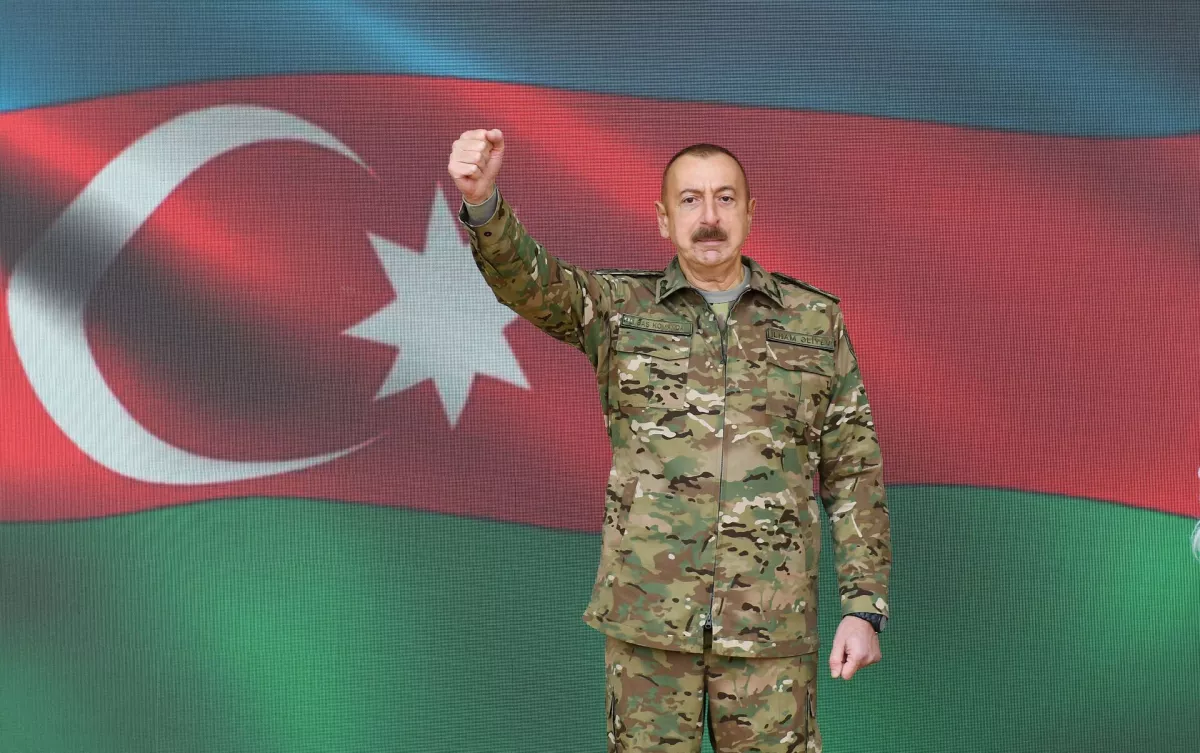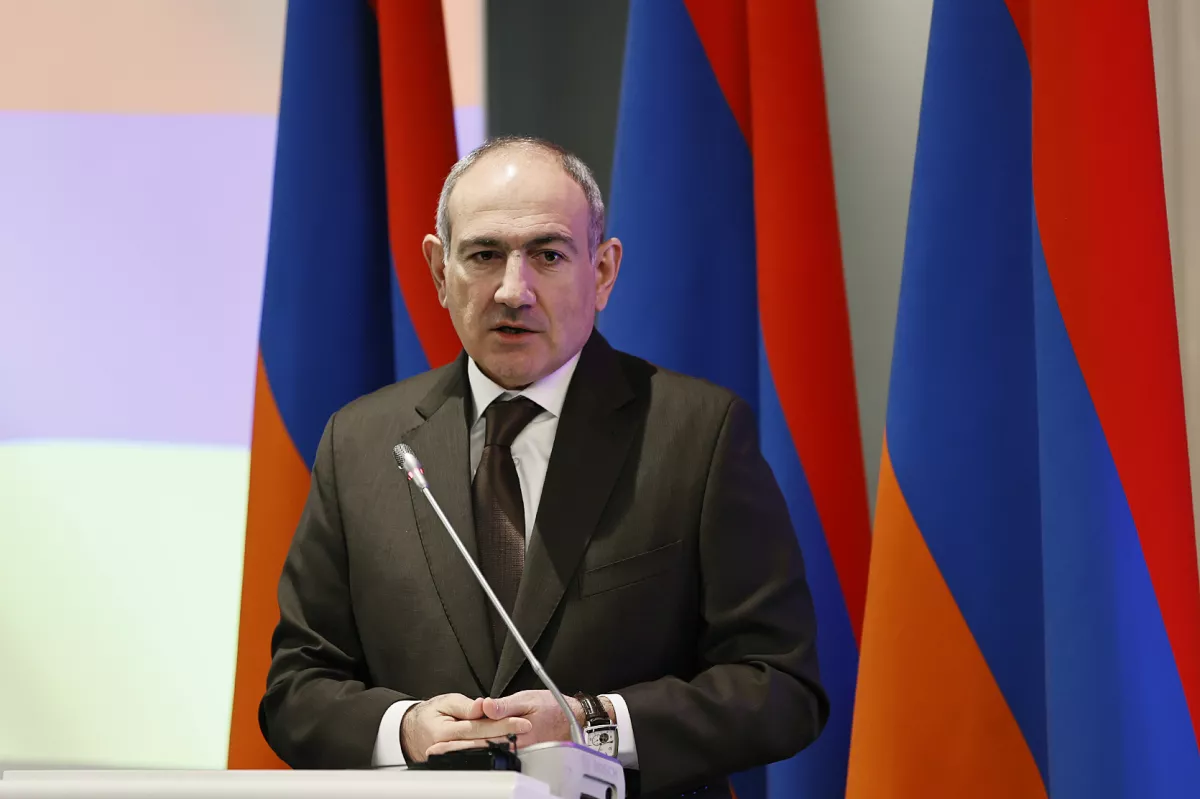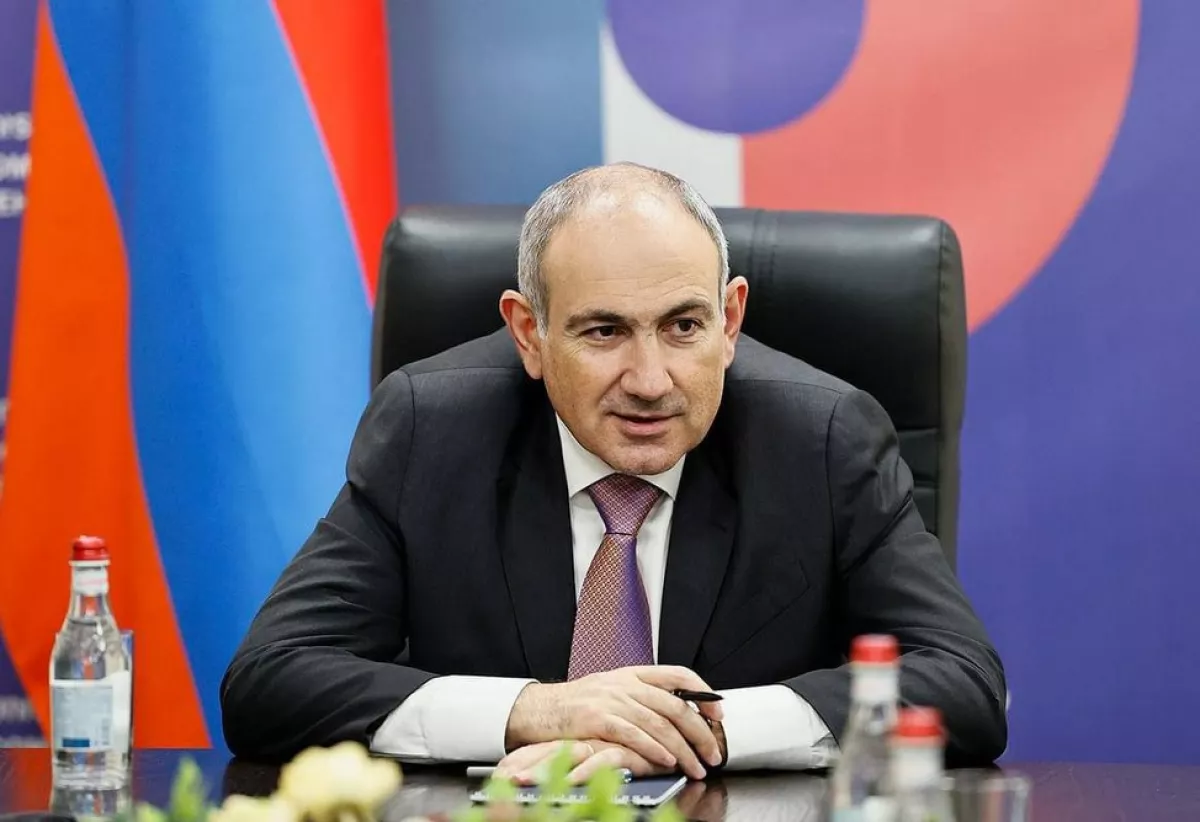The patient is stable: everything is askew and vague Pashinyan’s style in full display
Let’s start with a bit of recent history.
May 9, 2019. Armenian Prime Minister Nikol Pashinyan “joined the dancers during the May 9 celebrations in [occupied] Shusha.” The head of the Armenian government “stepped away from the tables where refreshments were being served to high-ranking guests in honour of the 27th anniversary of Shusha’s ‘liberation.’ With a glass of vodka in hand and surrounded by bodyguards, Pashinyan headed toward the Karin dance ensemble. Midway, he handed his glass to an aide and burst into the dancers’ circle.” This refers to Pashinyan’s drunken revelry on Jidir Duzu.
August 5, 2019. Pashinyan declares: “Karabakh is Armenia, period.” At the same event, he asserts that the so-called “people’s revolution” should be understood as an “all-Armenian revolution,” meaning that “the revolution must continue in Armenia, in Artsakh, and among Armenians worldwide.”
November 8, 2020. In an address to the nation, Azerbaijani President Ilham Aliyev proclaims: “The city of Shusha has been liberated from occupation! Shusha is ours! Karabakh is ours!”

April 23, 2024. The first child was born in Khankendi after the city’s liberation from occupation.
September 21, 2024. The first wedding ceremony took place in Khankendi after its liberation from occupation.
We will soon explain the reason for this brief historical excursion, but for now, let’s focus on some of the details Pashinyan outlined during the government hour in Armenia’s National Assembly. In particular, he stated: “I want to say clearly and unequivocally that I believe we should not continue the Karabakh movement.”

In light of the above, some might interpret Pashinyan’s latest maneuver as an acknowledgment of the historical realities that have taken shape in the South Caucasus over the past five years—especially considering that on October 6, 2022, at the European Political Community summit in Prague, he officially recognized Azerbaijan’s territorial integrity and sovereignty.
But how much credibility can be given to these Pashinyan-esque narratives, particularly when viewed through the lens of Azerbaijani President Ilham Aliyev’s remarks at the 12th Global Baku Forum? Let’s recall that just two weeks ago, the head of state firmly stated:
“The level of trust to Armenia is close to zero. So, we do not trust any of their words. Because they are not the people who we can trust, including today’s government. Again, all that they say, for us, has zero meaning. We need documents; we need papers. We need their constitution to be free of territorial claims against Azerbaijan. It still contains territorial claims against Azerbaijan. We need the OSCE Minsk Group to be dissolved. We convey this message to Armenia.”
At first glance, Pashinyan’s statement on March 26 could be perceived as a response to Aliyev’s message. But only if one ignores where these words were spoken. And that’s not the only issue.
Despite his declaration, Pashinyan wrapped his words in ambiguities, disclaimers, and convoluted rhetoric. While he spoke of Armenia’s “path to peace”, he framed it as “the most effective way to resolve the issue of prisoners”—by which he meant the leaders of the separatist movement in Azerbaijan, who are currently on trial in Baku for numerous crimes against the Azerbaijani people.
At the same time, the Armenian Prime Minister highlighted the government's “comprehensive and integrated approach” to addressing regional issues. But the question arises: where have the constitutional amendments in Armenia gone (we won’t even mention the Minsk Group)? The question is rhetorical because those amendments are exactly where they were before—they do not exist.
Moreover, while seemingly acknowledging the importance of signing a peace agreement with Baku, in response to a question about whether the text poses even 1% danger to Armenia or whether Yerevan is making any concessions, Pashinyan once again invoked the notion of “historical Armenia,” through which “this can be named however you like.” However, he clarified, “If we are talking about the sovereign territory of Armenia, meaning the Republic of Armenia, then nothing has been conceded. And not in terms of the peace agreement, but in general.”

Let’s be frank, without resorting to artificial nitpicking of the Armenian Prime Minister—can anything really be made out of Pashinyan’s words? For instance, what did he actually mean by “historical Armenia” this time? And what does he mean by “in general” in the context of “concessions”? What about “not from the perspective of the peace agreement”? If we are talking about a peace agreement, how can one approach the text without considering its “perspective”?
On the other hand, if Pashinyan confidently declares that “we should not continue the Karabakh movement”, why does he refer to the individuals being tried in the just Baku process as “illegally detained Armenian prisoners”? Who is the Armenian Prime Minister trying to deceive? Baku? Himself? The Armenian society? Or “historical Armenia”?
Moreover, he calls the issue of the accused a “humanitarian matter”—nothing more, nothing less. So, the genocide, urbicide, culturcide, and ecocide committed against the Azerbaijani people is merely a minor humanitarian issue. Quite serious, wouldn’t you agree?
Let’s move on and encounter the following. Recently, there has been an increase in shelling of sovereign Azerbaijani territory by Armenia, under the cover of the so-called EU civilian mission, which is filled with various types of intelligence agents. Pashinyan presented this as “actions by Azerbaijan at the borders of Armenia,” which, in his view, “can be considered as pressure and an information attack on Armenia.”
So, the shelling—that’s not even worth mentioning. According to Pashinyan, this is somehow Armenia’s peaceful approach. And the documented facts of these incidents, officially recorded by Baku—well, that’s just “an information attack on Armenia.” Should we take this seriously and with understanding? Or should we simply refer to the recent comment from Azerbaijan's Ministry of Foreign Affairs, which pointed out that, instead of taking steps to resolve the issues preventing the signing of a peace agreement, “the Armenian side is engaging in manipulations, presenting Azerbaijan as a country uninterested in peace.”
We can agree that even the nuances presented above, drawn from Pashinyan's latest statements, are more than enough to understand how the official Yerevan continues to twist and turn, maintaining the thesis about the importance of signing a peace agreement with Azerbaijan only in words. Although our geographical neighbors should have long understood that such games with Azerbaijan, which are destined to fail from the start, only create problems for Armenia itself.
Therefore, on March 25, Azerbaijan’s Ministry of Foreign Affairs stated that “if the Armenian side is genuinely interested in signing a peace agreement, it must promptly amend its constitution, renounce territorial claims against Azerbaijan, and not shy away from cooperating in the official dissolution of the Minsk Group.”
Clear and concise! Especially in light of what happened to Armenia after their anti-Azerbaijani insinuations in 2019, which we recalled at the beginning of the article.








